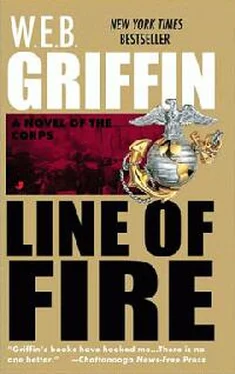W.E.B. Griffin - The Corps V - Line of Fire
Здесь есть возможность читать онлайн «W.E.B. Griffin - The Corps V - Line of Fire» весь текст электронной книги совершенно бесплатно (целиком полную версию без сокращений). В некоторых случаях можно слушать аудио, скачать через торрент в формате fb2 и присутствует краткое содержание. Жанр: prose_military, на английском языке. Описание произведения, (предисловие) а так же отзывы посетителей доступны на портале библиотеки ЛибКат.
- Название:The Corps V - Line of Fire
- Автор:
- Жанр:
- Год:неизвестен
- ISBN:нет данных
- Рейтинг книги:4 / 5. Голосов: 1
-
Избранное:Добавить в избранное
- Отзывы:
-
Ваша оценка:
- 80
- 1
- 2
- 3
- 4
- 5
The Corps V - Line of Fire: краткое содержание, описание и аннотация
Предлагаем к чтению аннотацию, описание, краткое содержание или предисловие (зависит от того, что написал сам автор книги «The Corps V - Line of Fire»). Если вы не нашли необходимую информацию о книге — напишите в комментариях, мы постараемся отыскать её.
The Corps V - Line of Fire — читать онлайн бесплатно полную книгу (весь текст) целиком
Ниже представлен текст книги, разбитый по страницам. Система сохранения места последней прочитанной страницы, позволяет с удобством читать онлайн бесплатно книгу «The Corps V - Line of Fire», без необходимости каждый раз заново искать на чём Вы остановились. Поставьте закладку, и сможете в любой момент перейти на страницу, на которой закончили чтение.
Интервал:
Закладка:
Stecker walked back out to the transient parking ramp. Pickering was nowhere in sight. After a moment, though, Stecker saw him standing near the open door to the dirigible hangar, talking to a Naval officer.
He just doesn't want to believe it really does rain inside there.
Well, screw you, pal, you are about to learn that it does.
(Four)
BUKA, SOLOMON ISLANDS
AUGUST 1942
Sergeant Steven M. Koffler was awakened in his quarters by Miss Patience Witherspoon. She squatted by his bed and squeezed his shoulder. Miss Witherspoon herself had constructed the bed, of woven grass ropes suspended between poles.
He opened his eyes and looked at her.
The fucking trouble with her, he thought, for perhaps the one-hundredth time, is her fucking eyes. They're clear and gray.
It's as if a real girl is looking out at me from behind that scarred face.
"There are engine noises, Steven," she said in her soft, precise voice.
"Right," he said.
He swung his feet out of bed and jammed them into his boondockers. They were green with mold, and he had no socks.
The three pairs he'd had when they jumped in had lasted just over a month.
He picked up his Thompson submachine gun and checked automatically. As usual the chamber was clear, with a cartridge in the magazine ready to be chambered. He slung the strap over his shoulder before he noticed Patience holding something out to him.
It was his other utility jacket, in no better shape than the one he'd been sleeping in, but Patience had obviously washed it for him.
"I'll save it for later," he said. "Thank you."
"Don't be silly," Patience said, modestly averting her eyes.
He took Mr. Reeves' German binoculars from the stub of a limb on one of the poles that held the hut together and hung them around his neck.
Then he walked to the tree house-there was no real reason for haste. Using the knotted rope, he walked up the tree side to the observation platform.
`What have we got, Ian?" he asked.
`Rather a lot, I would say," Ian replied. "They should be in sight any moment now." Steve could hear the muted rumble of engines and decided Ian was right. There were many of them.
And a moment later, as he scanned the skies, he saw the first of them. He handed the binoculars to Ian Bruce.
"Never let these out of your hands, Koffler," Mr. Reeves had told him just before he and Howard went off into the boondocks. "Ian is a rather good chap, but a curious one. Give him half a chance and he'll try to take them apart to see what magic they contain to make things bigger." When Ian handed them back a moment later, Steve noticed that the last tiny scrap of leather had finally fallen off the side of the binoculars. A thumbnail-sized area that had been glue still held on. But tomorrow that too would disappear and the binoculars would be green all over.
"Twenty to thirty, I would say," Ian said. "And I thought I could make out another formation a bit higher." Steve put the binoculars to his eyes again. The spots in the sky were now large enough to be counted. Six 5-plane V's.
Thirty. Almost certainly Bettys.
The Betty (designated the Mitsubishi G4MI Type I aircraft by the Japanese) was the most common Japanese bomber.
Koffler knew a good deal about the Betty: He could recite from memory, for example, that it was a twin-engine, land-based bomber aircraft with a normal complement of seven. It had an empty weight of 9.5 tons and was capable of carrying 2200 pounds of bombs, or two 1700-pound torpedoes, over a nominal range of 2250 miles, at a cruising speed of 195 miles per hour. Its maximum speed was 250 miles per hour at 14,000 feet.
It was armed with four 7.7mm machine guns, one in the nose, one on top, and two in beam positions, plus a 20mm cannon in the tail.
He knew this much about the Betty because there was very little to do on Buka. You could not, for example, run down to the corner drugstore for an ice-cream soda, or -more in keeping with his exalted status as a Marine sergeant- down to the slop chute for a thirty-five-cent two-quart pitcher of beer.
So, to pass the time, you exchanged information with your companions.
Thus Steve learned from Mr. Reeves that when Australians went rooting, they weren't jumping up and down cheering their football team. "Rooting" was Australian for fucking. He also learned that the American equivalent to the Australian term "sodding" was somewhere between "fucking" and "up your ass."
Mr. Reeves also explained to Lieutenant Howard and Sergeant Koffler the Australian system of government and its relationship to the British Crown. Steve never knew that Australia was started as a prison colony. He had too much respect for Mr. Reeves to ask him if his ancestors were guards or prisoners.
Lieutenant Howard, in turn, explained the American system of government to Mr. Reeves, who actually seemed interested.
Lieutenant Howard also shared his detailed knowledge of Japanese aircraft with Mr. Reeves and Sergeant Koffler. And Sergeant Koffler tried to explain the theory of radio wave transmission, but with virtually no success.
He gave the binoculars back to Ian, who kept them to his eyes until he was able to announce, with certainty, "Bettys. I make them thirty-five."
"I counted thirty," Steve said, putting the glasses to his eyes again.
Ian was right. There were thirty-five.
And the aircraft flying above them were Zeroes.
The Zero was the standard Japanese fighter aircraft, also manufactured by Mitsubishi, and officially designated the A6M. It was powered by a Nakijima 14-cylinder 925-horsepower engine, and was armed with two 20mm Oerlikon machine cannon and two machine guns, firing the British.303 rifle cartridge.
According to Lieutenant Howard it was a better airplane than anything the Americans or the English had. It was more maneuverable, and the 20mm cannons were not only more powerful but had greater range than the.50 caliber Browning machine guns on Navy and Marine aircraft.
"I count forty Zeroes," Steve said. "I'll get started. If anything else shows up, let me know."
"Right!" Ian said crisply.
Steve went down the knotted rope and walked to where the radio was kept, broken down. That way they could run with it if that became necessary.
He spotted Edward James and whistled at him. When he had his attention, he made a cranking motion with his hands.
Edward James popped to attention and saluted crisply.
"Sir!" he barked.
When he popped to attention, one of the two MACHETES, SUBSTITUTE STANDARD, he had hanging from his belt swung violently.
"Another inch and you'd have cut your balls off," Steve said.
It took Edward James a moment to make the translation into what he thought of as proper English.
"Quite, Sir," he said.
He then disappeared into the bush. When he returned a moment later he was carefully carrying a device that looked something like a bicycle. It was in fact the generator that powered Steve's radios. They originally jumped in with two. But one of these was now worn out beyond repair-both physically (the bearings were shot) and electrically (the coils were shorted). How long the other would last, nobody knew. Steve would not have been surprised if it failed to work now.
By the time Edward James returned with the generator, Steve had the radio connected to the antennae. Edward James proudly connected the generator leads to the radio and then went to string the antennae between trees.
Steve took out the code book-also on its last legs and just barely legible-and wrote out his message. He then encoded it.
By the time he was finished, Edward James was back. Steve made the cranking motion again.
"Right, Sir!" Edward James said. He got aboard the generator and started slowly and powerfully pushing its pedals. In a moment the dials on the radio lit up. Steve put earphones on his head, adjusted the position of the telegraph key, and threw the switch on the Hallicrafters to TRANSMIT. Then he put his hand on the key.
Читать дальшеИнтервал:
Закладка:
Похожие книги на «The Corps V - Line of Fire»
Представляем Вашему вниманию похожие книги на «The Corps V - Line of Fire» списком для выбора. Мы отобрали схожую по названию и смыслу литературу в надежде предоставить читателям больше вариантов отыскать новые, интересные, ещё непрочитанные произведения.
Обсуждение, отзывы о книге «The Corps V - Line of Fire» и просто собственные мнения читателей. Оставьте ваши комментарии, напишите, что Вы думаете о произведении, его смысле или главных героях. Укажите что конкретно понравилось, а что нет, и почему Вы так считаете.









